Alumni: Our Military Service Made Us Better Physicians, Leaders
Following her graduation with honors from Boston University’s six-year combined BA/MD program Christine Hunter, MD’80, reported to the USS Hunley, a submarine tender watching over nuclear-armed submarines.
Fresh out of a post-medical school internship, Hunter found herself the only doctor taking care of 1,200 sailors and officers on the 600-foot-long ship.
Though self-confident, at 4’10” and just 24 years old, Hunter knew she was not the typical command figure. She was among the first cohort of female officers to serve aboard Navy vessels and would oversee a medical department of 20 enlisted men, ranging from 19-year-olds with just six months of training to experienced corpsmen-the Navy equivalent of medics-who were deployed far from home with limited access to help.
“When I got my orders, I called my recruiter and said, ‘What in the world am I supposed to do?’” recalls Hunter, who lacked a military background. The recruiter urged her to simply show up and do her best.
Fortunately, the military has a longstanding policy of pairing inexperience with experience, regardless of rank.
“It was all on-the-job training, and God bless the corpsmen and my fellow officers because they trained me in all the things I needed to know to be successful,” Hunter says.
It was all on-the-job training, and God bless the corpsmen and my fellow officers because they trained me in all the things I needed to know to be successful.
Now retired from the Navy and a two-star admiral, she was the first woman to be named Pacific Fleet Surgeon, then served as commanding officer at Naval Medical Center San Diego before finishing her time in uniform as the senior military officer overseeing the TRICARE military healthcare program of 9.6 million subscribers. After retiring from active duty, she was named chief medical officer of the US Office of Personnel Management, overseeing healthcare delivery to 8.3 million members.
Each year, BU medical students choose to become military physicians. Some make it a career, as Hunter did, while others leave after they have fulfilled their active-duty commitments.
All agree its a rewarding, personally fulfilling experience that molded them into better physicians and healthcare leaders.
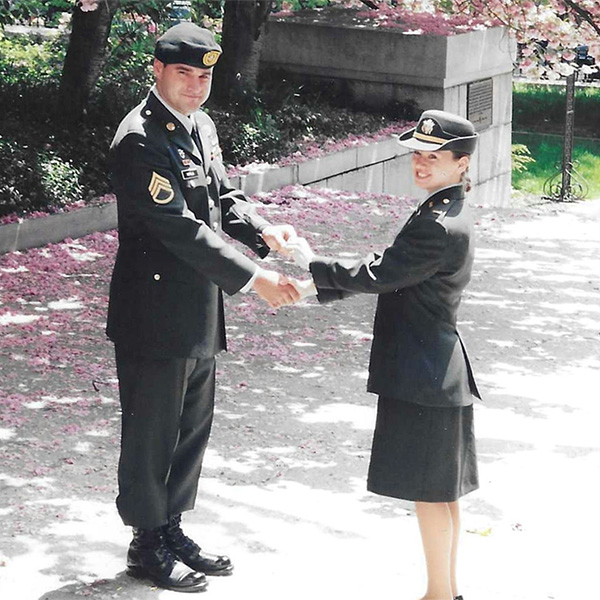 Anna Hohler, MD’98, receives her first coin and salute from her brother Staff Sergeant Gerald DePold in 1995. Photo courtesy of Hohler
Anna Hohler, MD’98, receives her first coin and salute from her brother Staff Sergeant Gerald DePold in 1995. Photo courtesy of Hohler
“I think the military provides you with an amazing framework for leadership, self- discovery, and service to our country,” says Anna Hohler, MD’98, chair of neurology at St. Elizabeth’s Medical Center in Brighton, Massachusetts. Hohler was active duty in the Army for eight years, including her time in the Reserve Officers Training Corps (ROTC) while in medical school. A tradition of service runs in Hohler’s family, with uncles, cousins, and two brothers in the military. “It was important to us to serve our country, and that was something we were always proud of,” she says.
The rewards of military service go beyond personal fulfillment.
“It’s a close-knit community. We all work off a shared sense of purpose,” says Lt. Colonel Sarah Bowe, MD’08, an otolaryngologist who has been active duty in the Air Force for more than 15 years. Bowe also comes from a family tradition of military service, including a great uncle who was a decorated Navy veteran, a great aunt who was an Army nurse, and a grandfather who retired as a major in the Air Force and commissioned her when she entered the service.
BU’s strong links to the military include being one of only five universities in Massachusetts offering ROTC membership and training. The medical school established the Center for Military Health in 2015, which is dedicated to improving the health of veterans and service members by coordinating interdisciplinary research and developing clinical innovations and programming on medical issues particular to the military.
In addition to family history and a sense of duty, the financial benefits inspire some med students to enlist. “The reason I went in was completely about financial expediency. But I stayed for the opportunities and the camaraderie,” says Hunter.
“We didn’t have a lot saved for my college education,” says Kim Dever, MD’92, whose father was a firefighter and her mother a homemaker.
Dever is now vice president of women’s health and chair of obstetrics & gynecology at South Shore Health in Weymouth, Massachusetts.
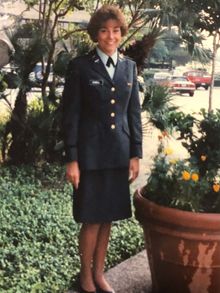 Kim Dever, MD’92, after completing the Officers Basic Training course at Fort Sam Houston in San Antonio, Texas. Photo courtesy of Dever
Kim Dever, MD’92, after completing the Officers Basic Training course at Fort Sam Houston in San Antonio, Texas. Photo courtesy of Dever
“Always in the back of my mind was that my parents were very concerned about the finances of four years in medical school,” she recalls.
When a college classmate went to talk to a military recruiter, she tagged along and enlisted. The military financial package, known as the Health Professions Scholarship Program (HPSP), pays a signing bonus of $20,000 plus the cost of tuition, books, supplies and equipment, a monthly stipend of approximately $2,700, and officer’s pay while on active duty. HPSP students are considered reservists and must complete six weeks of active duty every year during medical school and residency; their years in residency are not covered by scholarships or stipend and the student is obligated to four years active duty. Further subsidized training in a specialty adds to the active-duty time obligation.
“I definitely thought I was going to be in that camp, you know, do my four years and out,” says Brian Norwood, MD’03, a pediatrician at Sentara Health in Virginia who recently retired with the rank of captain after 20 years in the Navy. While the financial incentives were initially a factor, Norwood also enjoyed the travel.
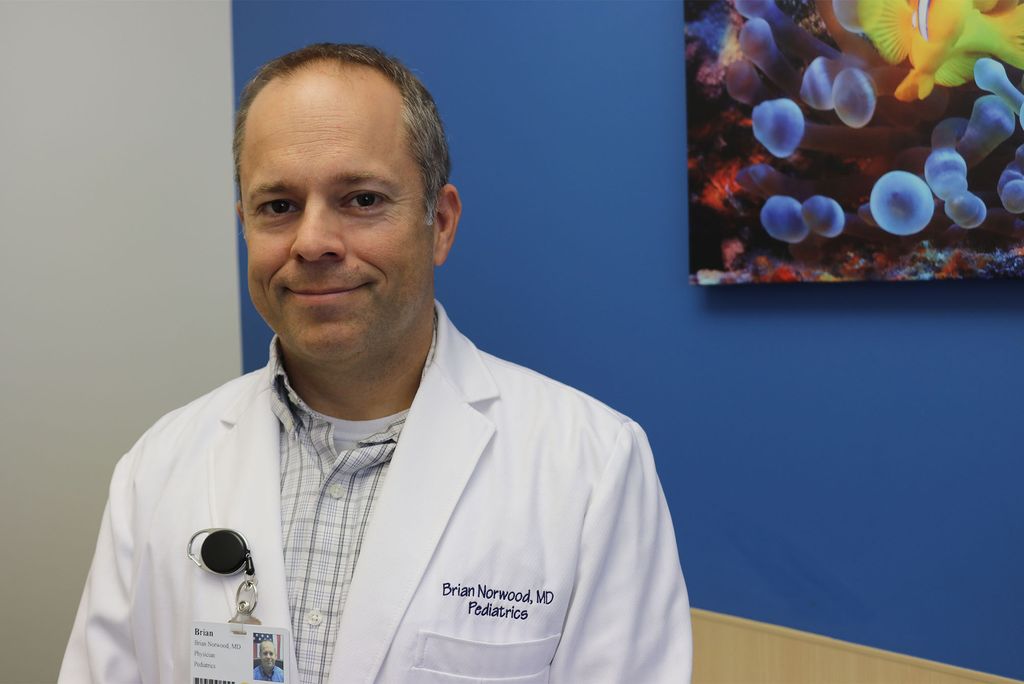 Retired Navy Captain Brian Norwood, MD ’03, is now a pediatrician at Sentara Health in Virginia. Photo by Dale Gaulding at Sentara Health
Retired Navy Captain Brian Norwood, MD ’03, is now a pediatrician at Sentara Health in Virginia. Photo by Dale Gaulding at Sentara Health
His first active-duty posting was a large naval base in Yokosuka, Japan, a city of 400,000 surrounded by the sea and mountains and blessed with a mild climate. Yokosuka proved the perfect home base for trips around Japan for Norwood, his wife, and their first child during the three years he was stationed there.
“We just loved it,” he says.
Norwood and his family next moved to Norfolk, Virginia, where he became the senior medical officer on the 833-foot amphibious assault vessel USS Nassau, which was capable of carrying as many as 3,000 personnel. There, he oversaw a 300-bed floating hospital and a staff of nine physicians. Layered on top of the daily rounds seeing patients, consulting with other physicians, and meetings was the routine of the ship, with jets and helicopters taking off and landing amid the ever-changing sea and exotic ports-of-call.
“It was probably the most fun job I ever had,” he says.
Like everyone else who serves in the military, Norwood has a fascinating story about the experience. He recalls an episode from a relief mission to Haiti following the devastating 2010 earthquake that killed 220,000 people. He was up on flight deck of the Nassau when a helicopter landed.
“There was a guy on a stretcher, and at the end of the stretcher there was a box with a hand-written message that said, ‘Baby in box, do not throw out.’ We looked inside and, sure enough, there’s a baby inside, probably a day old, with the umbilical cord still attached.
You have a whole (medical) department of people who are away from their families, and everyone wanted to hold this baby and feed it,” he says. In a happy ending, the baby was reunited with its mother, who was recovering on a nearby medical ship.
“This is what the military offers, these unique opportunities,” says Marisela Noorhasan, MD’02, an endocrinologist and obesity medicine specialist who joined the Navy while she was attending BU and is now a captain in the Navy Selected Reserves.
Born in Guyana, Noorhasan moved with her family around the Caribbean before finally settling in the US Virgin Islands. After graduating from the University of the Virgin Islands, she moved to Boston to study medicine through BU’s Early Medical School Selection Program.
Following medical school, Noorhasan went on active duty, completing an internal medicine residency and serving as senior medical officer at Camp Buehring, Kuwait, during Operation Enduring Freedom from 2009-2010. Other postings included responding to Hurricane Katrina in 2005 in New Orleans and working with the Brazilian Navy and local physicians treating tropical diseases along the Amazon River basin in 2008. She recently returned from service on the USNS Mercy, a 1,000- bed hospital ship on a disaster response preparedness mission in the Indo-Pacific.
“Joining the military opened many avenues for education, training, leadership, and career opportunities,” says Noorhasan. “In the military there is camaraderie, a sense of belonging, and a support structure to foster personal and professional growth.”
After eight years active duty, Noorhasan transitioned into the reserves and for the past 11 years has held various administrative positions, currently serving as chief medical officer at Navy Medicine Readiness and Training Command Corpus Christi, Texas. During her time on active-duty and in the naval reserves, Noorhasan has relocated many times for deployments, career opportunities, education, and training.
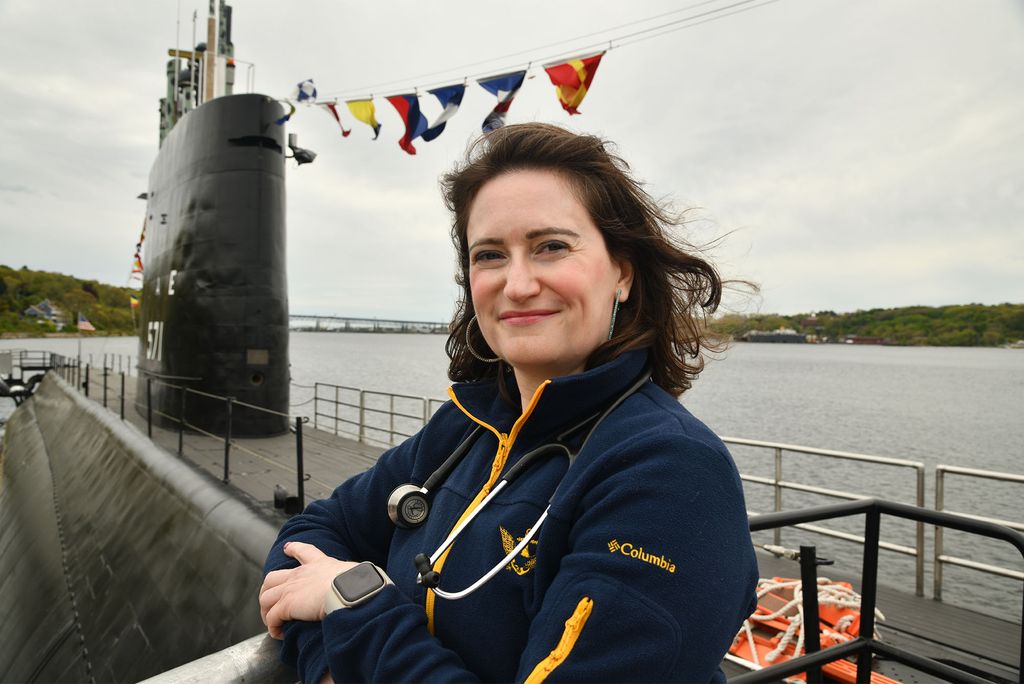 Adrienne Parad, MD’07, in front of the historic USS Nautilus at the Submarine Force Museum in Groton, Connecticut. Parad served seven years in the Navy, including at the Naval Submarine Base New London, Connecticut. Photo by Jake Mackey
Adrienne Parad, MD’07, in front of the historic USS Nautilus at the Submarine Force Museum in Groton, Connecticut. Parad served seven years in the Navy, including at the Naval Submarine Base New London, Connecticut. Photo by Jake Mackey
“I would like to say that you can choose your own destiny, but when you sign that contract, you are committing yourself to the US Navy or another branch of the service, and they have final say over where you’re going to be living,” says family physician Adrienne Parad, MD’07, who served seven years in the Navy.
Parad’s first duty station was at the Navy hospital in Pensacola, Florida, tending to a flight community that included the Navy’s prestigious Blue Angels. Along with her husband Andrew Parad, MD’06, also a Navy physician, she deployed to US Naval Forces Central Command in Bahrain, where they witnessed the upheaval that took place during the Arab Spring. Following that, she was posted to Naval Submarine Base New London in Groton, Connecticut.
In military life, deployment to a combat zone is always a possibility. “{Enlistment} is not a decision to be taken lightly,” says Air Force veteran Bowe, now an associate professor of surgery at the Uniformed Services University’s largest campus in San Antonio, Texas. “You have to be in line with the overall mission of the military and the underlying values of what it is to be a military officer-and be comfortable with the fact that you may be put into challenging situations and may be deployed overseas away from your family.”
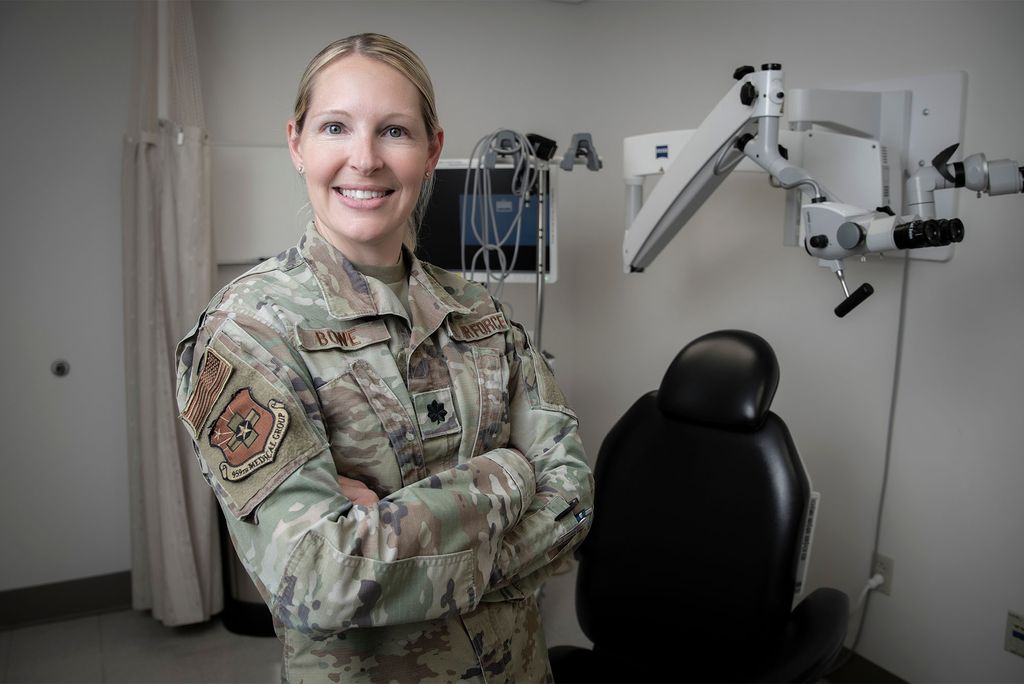 “It’s a close-knit community. We all work off a shared sense of purpose.” — Lt. Colonel Sarah Bowe, MD’08. Photo by Jason Edwards, Brooke Army Medical Center Public Affairs
“It’s a close-knit community. We all work off a shared sense of purpose.” — Lt. Colonel Sarah Bowe, MD’08. Photo by Jason Edwards, Brooke Army Medical Center Public Affairs
Joining the Army was “a sound business decision,” says family physician Randolph Taylor II, MD’06. Ending up “downrange,” military slang for a war zone, seemed only a slight possibility. But with ongoing conflicts in Iraq and Afghanistan, Taylor found himself worrying about being deployed to a combat zone. He discussed his concerns with Jonathan Woodson, MD, former school of medicine associate dean of multicultural affairs (now the diversity & inclusion office), and professor of surgery.
“It’s our youngest men and women on the front lines, putting their lives on the line to protect us. And if something happens to them, they need the best medical care,” Taylor recalls Woodson saying.
Glenn Markenson, MD, professor of obstetrics & gynecology and director of the Center for Military Health, counsels between five and 10 medical students a year who are considering the military option; one or two each year decide to sign up.
“I make sure they understand that there is risk,” says Markenson, a retired Army colonel with nearly 26 years of service including active duty, reserves, and National Guard. “They most likely will get deployed and it could be in a war zone. If that’s something they think that they would not be able to handle, then the military wouldn’t be for them.”
I make sure they understand that there is risk. They most likely will get deployed and it could be in a war zone. If that’s something they think that they would not be able to handle, then the military wouldn’t be for them.
Markenson, who served as a physician during operations Desert Storm and Iraqi Freedom, worked in an evacuation hospital during the Gulf War (1990-91), stabilizing soldiers for transport to hospitals in the US and elsewhere.
In February 1991, an Iraqi Scud hit a makeshift barracks in Dhahran, Saudi Arabia, killing 27 US troops and wounding 98. Many came to Markenson’s facility. “A lot of them died. It’s serious stuff and [medical enlistees] must be ready for that,” he says.
Woodson retired from the Army reserves in 2022 as a major general after 36 years of service—including in Saudi Arabia, Kosovo, and Iraq-and is now president of the military’s Uniformed Services University (USU). Made up of four schools and colleges and 20 research centers spread across three campuses, USU serves the military medical professions with medical, dental, nursing, and allied sciences schools.
As an associate dean at BU’s medical school, he counseled students experiencing financial hardships, with military enlistment an option to ease the burden. He recalls students being concerned about two things: the active-duty commitment time and the impact of military service on their career development.
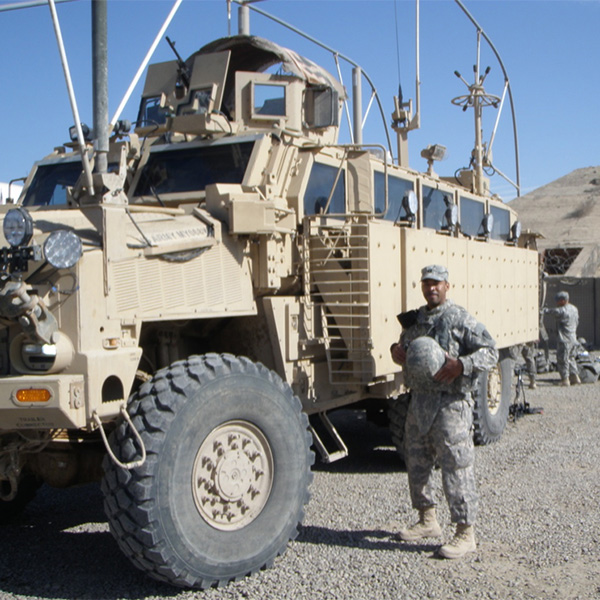 Randolph Taylor II, MD’06, in Iraq. Photo courtesy of Taylor
Randolph Taylor II, MD’06, in Iraq. Photo courtesy of Taylor
“I would tell them there’s a lot of opportunity to diversify in terms of a specialty, but more importantly, that they would come out of their service with much broader skills than their peers because they were in an environment in which they had to understand leadership and commitment to mission,” he says.
Taylor believes that the exceptional training he received while in the Army, particularly trauma training to prepare him for deployment to a combat zone, carried over into his private practice. Deployed to Iraq, he would ride to a forward-operating base in a Humvee that jammed signals sent to Improvised Explosive Devices planted along their route.
“Combat injuries weren’t in the majority, but when they happened, they were very, very bad,” Taylor says. “We trained medically for mass casualties; we went through every scenario we could think of.”
We trained medically for mass casualties; we went through every scenario we could think of.
After six years of active duty, he left the Army as a major in 2012 and entered sports and family medicine in Houston, Texas, serving as the ringside physician for the mixed martial arts Ultimate Fighting Championship and Top Rank Boxing. Taylor now lives in Atlanta, Georgia. He encourages medical students who ask him about joining the military to join up.
“I tell them ‘Do it!’—it made me a better doctor,” says Taylor. “I didn’t have X-rays downrange; I didn’t have all these fancy blood tests and stuff like that. All I had was the clinical knowledge I’d learned and the book knowledge to make a diagnosis. That allowed me to hone my skills. It’s a good thing to do, both professionally and financially.”
Many BU alumni agree that the most valuable skill they learned from their military experience was how to be a leader.
 Adrienne Parad, MD’07, pictured on board the historic USS Nautilus Submarine Force Museum in Groton, Connecticut. Parad served seven years in the Navy, including time at the US Naval Base New London. Photo by Jake Mackey
Adrienne Parad, MD’07, pictured on board the historic USS Nautilus Submarine Force Museum in Groton, Connecticut. Parad served seven years in the Navy, including time at the US Naval Base New London. Photo by Jake Mackey
“I had so many opportunities as a young practicing physician to take on leadership roles,” says Parad. “When I transitioned out, I had all these leadership skills.”
Within two years of leaving the Navy, Parad was on the executive committee and ultimately. became vice president of the medical staff at Lawrence & Memorial Hospital in New London, Connecticut. She is now a physician clinical reviewer with Evolent Health.
An OB/GYN, Dever completed four years of residency followed by four years active duty at a military hospital in Germany. She left the Army in 2000, but says the military’s emphasis on leadership and responsibility paved her way into hospital administration.
“A lot of what I learned was how to manage people. Being put in a leadership position, especially as a young woman, really gave me the opportunity to stand up for myself,” says Dever. “The military is very male-oriented, and so is medicine. I learned very early on that I’m going to have a voice and I need to represent my department and the patients.”
Dever’s military experience taught her the importance of being organized, knowing policy, and operating within the chain of command. She found employers valued those skills and had high levels of confidence in the leadership abilities of military physicians.
“Most people wait 10 or 20 years longer to have this opportunity,” says Hohler, reflecting on being named the first female chair of neurology at St. Elizabeth’s Medical Center in 2017 at age 45, after working at BU and BMC as the inaugural director of the Center for Military Health and assistant dean for strategic & affiliate relations. “A lot of my leadership positions in the military—and after—were due to the great training I had in the military.”
While on active duty in the Army, Hohler filled several leadership roles, including at the Madigan Army Medical Center in Tacoma, Washington, where she served as the neurology residency program director and the neurology clinic chief.
“I tell everyone that in the military, one of the big areas of focus is developing leadership skills. In my ROTC training at BU, I was instilled with all types of skills and tools to be able to lead effectively,” Hohler says. “There’s leadership when the waters are calm and there is leadership in choppy waters. The thing about the military is, they train you for both.”
This story, written by Doug Fraser, appeared in BU Today and Boston University Medicine magazine.